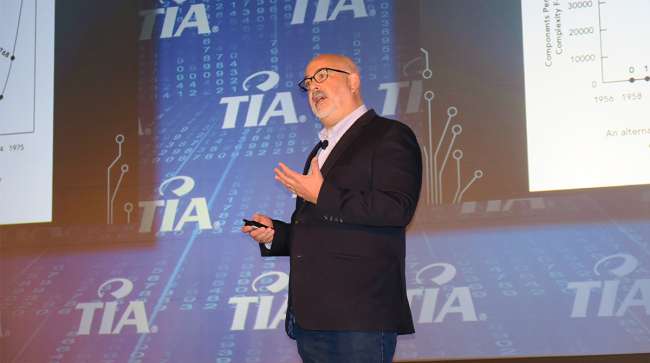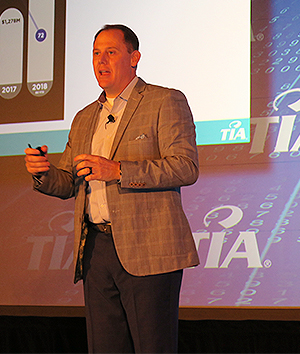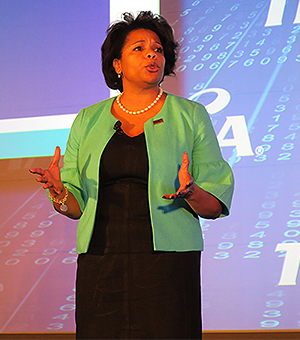Managing Editor, Features and Multimedia
Freight Brokers, 3PLs Must Embrace Technology or Face Disruption, Experts Say

TUCSON, Ariz. — Rapid advances in technology and an infusion of venture capital are fueling innovation that is transforming the freight transportation industry.
To remain competitive in this changing environment, freight brokers and third-party logistics firms will need to adapt or risk being left in the dust, technology experts and logistics leaders said here at the Transportation Intermediaries Association’s inaugural 3PL Technovations conference, held Nov. 6-7.
RELATED: Growing logistics startup FourKites moving to larger office
“We are in the middle of a revolution,” said Kurt Cavano, senior vice president and general manager of GT Nexus, a cloud-based network for global supply chain management. “We can stand by and watch, or we can take advantage of it.”
Exponential increases in computing power have given rise to consumer smartphones that are far more powerful than the computers NASA used during the Apollo program. Now, the latest jumps in processing power are enabling the emergence of artificial intelligence applications, opening up a world of new possibilities, Cavano said.
Kurt Cavano: Exponential growth of processing power is enabling #AI and machine learning, which are poised to transform the transportation industry. “You’re either going to be on the train, or you’re going to be run over by the train.” #TIA2018tech @3PLAssociation pic.twitter.com/2AoGwA4kd1 — Seth Clevenger (@SethClevenger) November 6, 2018
Meanwhile, investors are paving the way for further innovation. Cavano cited $1.1 trillion in venture capital and private equity “dry powder” that has been committed for investment but remains unspent.
“Whatever way this money is invested, it’s going to totally transform our industry because there’s so much money chasing opportunity,” he said.
This inexorable advance of technology is creating a fundamental shift in our society on a scale comparable to the industrial revolution, Cavano said. And much like the industrial revolution, there will be winners and losers.
“We’re going to go through this incredible transformation, and it’s going to leave no one undamaged,” he said. “You’re going to either be on the train, or you’re going to be run over by the train.”
Jason Beardall, president of England Logistics and chairman of TIA’s board, encouraged conference attendees to view emerging technology not as a threat, but as an opportunity.
While some may fear that coming technologies could lead to disruption and disintermediation — even to the point of replacing the broker or 3PL provider — logistics firms also can seize opportunities to harness the latest technology to benefit their customers and create efficiencies while gaining a competitive advantage in the marketplace, he said.

Beardall (Seth Clevenger/Transport Topics)
“When you look at the amount of dollars being invested, and then you couple that with the brilliance of what is being created and developed, the problem is not the availability of technology,” Beardall said. “The problem is our willingness and our pace of adoption.”
TIA President Bob Voltmann echoed that message.
“If we don’t change and adapt, we’re dying,” he said, encouraging 3PLs to be the disrupters, not the disrupted.
One clear example of how technology could improve the supply chain is in the utilization of truck capacity, particularly amid this strong freight market.
Beardall suggested that if brokers and 3PLs fully embraced the technology that’s available today, the industry might be able to offset the capacity shortage by curbing wasted, empty and out-of-route miles and reducing or eliminating driver detention time.
Mark Carroll, director of product strategy for Descartes MacroPoint, advocated for more data sharing among 3PLs to unlock “trapped capacity.”
When a 3PL books a truck and the carrier completes the delivery, that truck often isn’t matched with the most efficient route to take next because that route isn’t available in that particular 3PL’s network.
“Because we work in a closed environment, the information around that carrier isn’t shared, and the capacity becomes trapped within your four walls,” Carroll said. “We believe in open, agnostic networks where we can share information.”
Descartes Systems acquired freight visibility provider MacroPoint in 2017.
In the meantime, the constrained capacity environment actually has validated the role of the 3PL and the freight broker in the marketplace, said Tom McLeod, CEO of McLeod Software.
“There were some thinking that as the driver-capacity issue came down the pike, the broker might be squeezed, but in fact it has accelerated the way that shippers are outsourcing their freight,” he said. “They have no core competency in maintaining relationships with wide numbers of carriers. This is something that freight brokers do extremely well, and this is the key to having reliable capacity.”

Hood (Seth Clevenger/Transport Topics)
TIA’s new Technovations conference, which the association intends to continue as an annual event, reflects a growing emphasis on technology in the 3PL and brokerage space.
The new event is part of a broader effort by TIA to help its members understand and embrace the technologies that are available to them, said Ramona Hood, vice president of operations strategy and planning at FedEx Custom Critical and chairman of TIA’s technology committee.
“There’s a lot going on with technology,” she said. “You hear about disruption. You hear about transformation. And the goal of the committee is to give you the information and the insights so you can be an early adopter” and create a “competitive edge for your business.”




